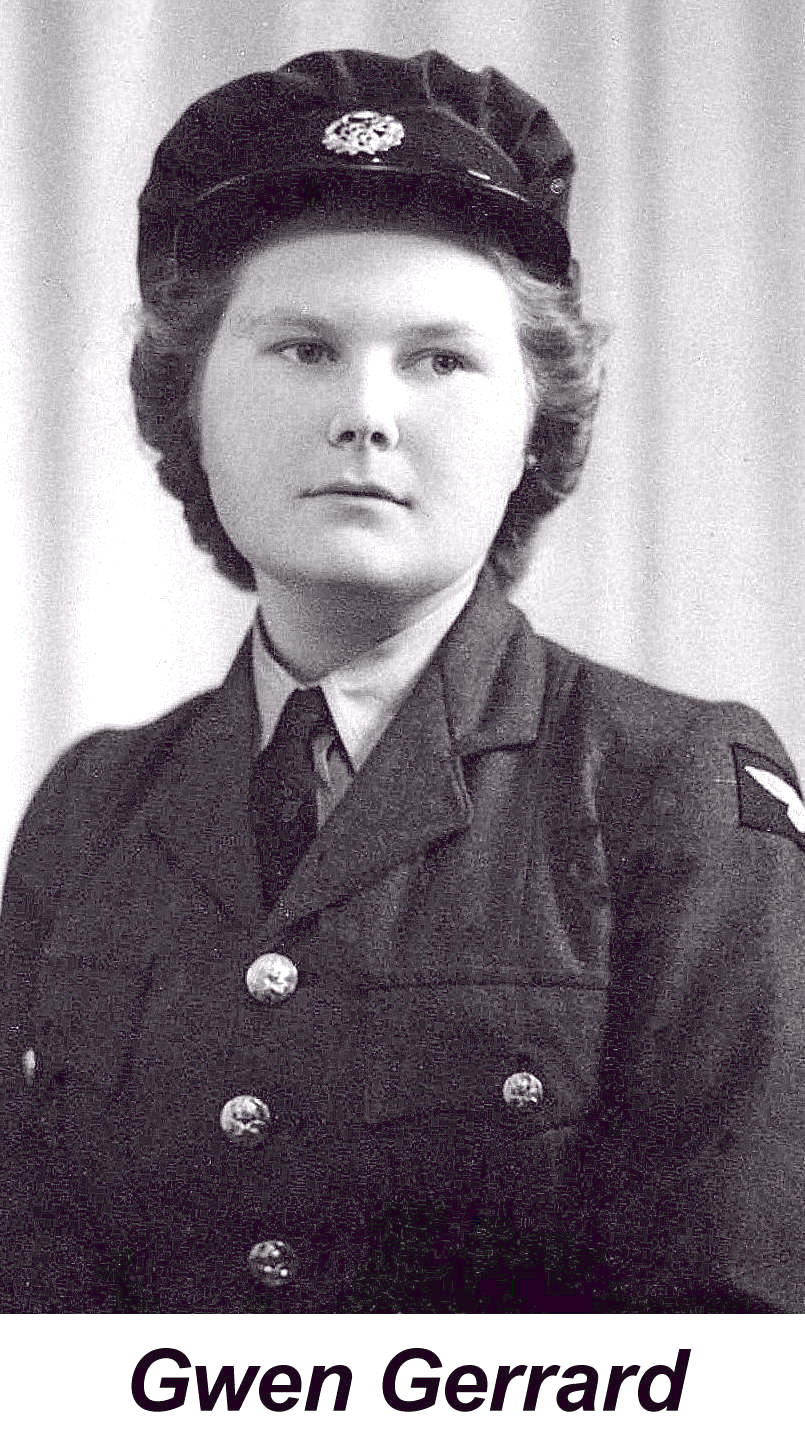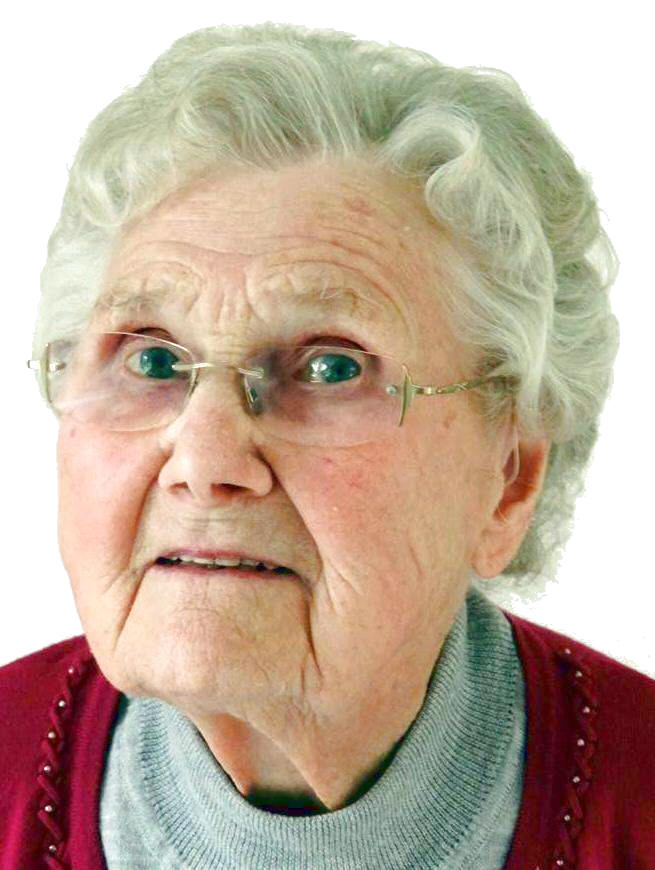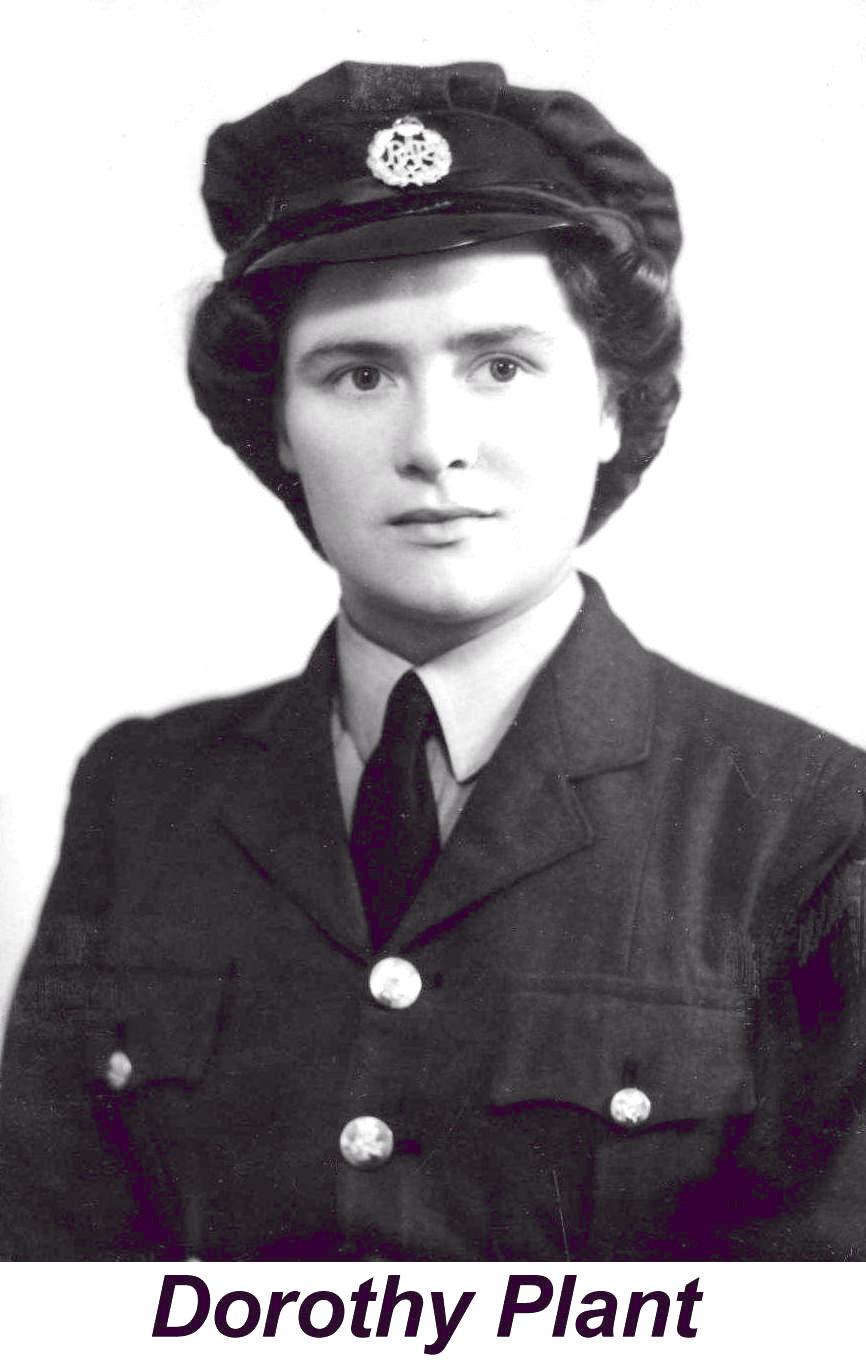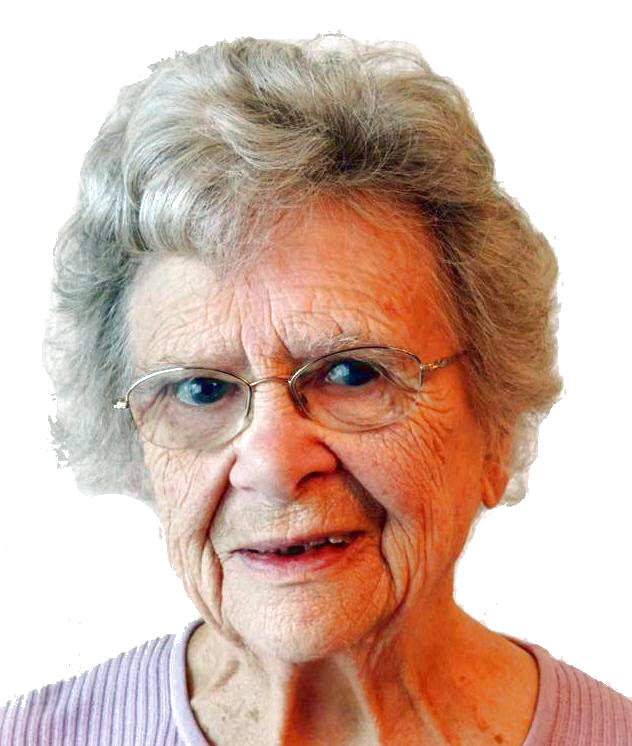The Second World War was waged throughout Europe, into
North Africa, Asia and the Far East. It was fought on land, at sea and in the
air. It was fought clandestinely in occupied countries by ordinary men and women
and, even though the UK was fortunate not to live under the jack boot, there was
a secret, silent army working around the clock to keep the country safe. This
army consisted of both military and civilian personnel who worked together in
harmony to help bring down the enemy. They worked in absolute secrecy in small
groups and for decades after the conflict was over they never talked about their
vital jobs.
 Living
in the Staffordshire town of Uttoxeter were two eighteen year old friends, Gwen
Gerrard and Dorothy Plant. When the time came they were called up for military
service and they joined the Women’s Auxiliary Air Force (the WAAFS). Both of
them, it would appear, had an aptitude for Morse code (twenty four words a
minute was what was aimed for) and they were posted to Cheadle and Tean,
not far from their home town, and there they spent the war – listening.
Living
in the Staffordshire town of Uttoxeter were two eighteen year old friends, Gwen
Gerrard and Dorothy Plant. When the time came they were called up for military
service and they joined the Women’s Auxiliary Air Force (the WAAFS). Both of
them, it would appear, had an aptitude for Morse code (twenty four words a
minute was what was aimed for) and they were posted to Cheadle and Tean,
not far from their home town, and there they spent the war – listening.

Gwen and Dorothy were two cogs in the operation of which the
National Codes Centre, Bletchley Park, was the centre. Reading its official
guide it would appear that through the back gates of the mansion came despatch
riders bringing intercepted German messages from RAF Chicksands and from RAF
Stanbridge. The latter was the collection point for intercepts from a ring of
local stations mainly situated on the Dunstable Downs. Intercepts from more
distant stations arrived on teleprinters via the GPO telephone system. These
were the ‘Y’ stations,- the web of listening stations dotted around the country
providing the code breakers with their raw material. Cheadle and Tean were two
such stations and this was the work undertaken by our two girls. The security at
these listening posts was extremely tight and the gates were guarded
continuously by the police.Each day was divided
into three watches of eight hours and the work consisted of listening to the
messages sent out by the Luftwaffe. At times the messages came in thick and fast
which had to be written down at speed. There was a half hour
 break only. Both
Gwen and Dorothy said morale was good and both civilian and military personnel
got along well together. They quickly got used to wearing head phones for eight
hours at a stretch and both said they could not remember them being
uncomfortable to wear. Gwen tells me that during the night watch she was allowed
to while away her listening hours doing some embroidery and she decorated quite a few table cloths during her time at Cheadle! The messages picked up during the
night watch were sent on the following morning. Their living accommodation was
not luxurious, consisting of huts, and the food was certainly not haute cuisine!
Gwen says she
break only. Both
Gwen and Dorothy said morale was good and both civilian and military personnel
got along well together. They quickly got used to wearing head phones for eight
hours at a stretch and both said they could not remember them being
uncomfortable to wear. Gwen tells me that during the night watch she was allowed
to while away her listening hours doing some embroidery and she decorated quite a few table cloths during her time at Cheadle! The messages picked up during the
night watch were sent on the following morning. Their living accommodation was
not luxurious, consisting of huts, and the food was certainly not haute cuisine!
Gwen says she
 has never
eaten potatoes since she was demobbed! Dorothy was
billeted in a hut in the grounds of a private house and going back there in the
blackout was not fun! Tean was allegedly haunted and
on a certain night the lights would go out. The staff were warned about this and
it did happen (possibly something ‘secret’ was going on at the time.) Neither of
them could remember how much leave they were allowed, but Dorothy admitted to a
bit of ‘moonlighting’. Her commanding officer had been the manager of the shoe
shop in which she had worked before call up and on occasions she was able to
take her
leave to coincide with the holiday of the manageress. She would go home and go
back into
the shop to hold the fort, so to speak.
has never
eaten potatoes since she was demobbed! Dorothy was
billeted in a hut in the grounds of a private house and going back there in the
blackout was not fun! Tean was allegedly haunted and
on a certain night the lights would go out. The staff were warned about this and
it did happen (possibly something ‘secret’ was going on at the time.) Neither of
them could remember how much leave they were allowed, but Dorothy admitted to a
bit of ‘moonlighting’. Her commanding officer had been the manager of the shoe
shop in which she had worked before call up and on occasions she was able to
take her
leave to coincide with the holiday of the manageress. She would go home and go
back into
the shop to hold the fort, so to speak.
As we are all aware, the absolute secrecy that surrounded
Bletchley Park, Chicksands, Stanbridge and all the listening stations lasted for
decades and it is only in recent years that this army of women have spoken about
their absolutely vital role in the war. Both Gwen and Dorothy felt some initial
reluctance in talking about it and breaking what had been the habit of a life
time. I am happy to say that they did agree to talk to me and both have thanked
me and said how it brought back some happy memories.
 Living
in the Staffordshire town of Uttoxeter were two eighteen year old friends, Gwen
Gerrard and Dorothy Plant. When the time came they were called up for military
service and they joined the Women’s Auxiliary Air Force (the WAAFS). Both of
them, it would appear, had an aptitude for Morse code (twenty four words a
minute was what was aimed for) and they were posted to Cheadle and Tean,
not far from their home town, and there they spent the war – listening.
Living
in the Staffordshire town of Uttoxeter were two eighteen year old friends, Gwen
Gerrard and Dorothy Plant. When the time came they were called up for military
service and they joined the Women’s Auxiliary Air Force (the WAAFS). Both of
them, it would appear, had an aptitude for Morse code (twenty four words a
minute was what was aimed for) and they were posted to Cheadle and Tean,
not far from their home town, and there they spent the war – listening.

 break only. Both
Gwen and Dorothy said morale was good and both civilian and military personnel
got along well together. They quickly got used to wearing head phones for eight
hours at a stretch and both said they could not remember them being
uncomfortable to wear. Gwen tells me that during the night watch she was allowed
to while away her listening hours doing some embroidery and she decorated quite a few table cloths during her time at Cheadle! The messages picked up during the
night watch were sent on the following morning. Their living accommodation was
not luxurious, consisting of huts, and the food was certainly not haute cuisine!
Gwen says she
break only. Both
Gwen and Dorothy said morale was good and both civilian and military personnel
got along well together. They quickly got used to wearing head phones for eight
hours at a stretch and both said they could not remember them being
uncomfortable to wear. Gwen tells me that during the night watch she was allowed
to while away her listening hours doing some embroidery and she decorated quite a few table cloths during her time at Cheadle! The messages picked up during the
night watch were sent on the following morning. Their living accommodation was
not luxurious, consisting of huts, and the food was certainly not haute cuisine!
Gwen says she
 has never
eaten potatoes since she was demobbed! Dorothy was
billeted in a hut in the grounds of a private house and going back there in the
blackout was not fun! Tean was allegedly haunted and
on a certain night the lights would go out. The staff were warned about this and
it did happen (possibly something ‘secret’ was going on at the time.) Neither of
them could remember how much leave they were allowed, but Dorothy admitted to a
bit of ‘moonlighting’. Her commanding officer had been the manager of the shoe
shop in which she had worked before call up and on occasions she was able to
take her
leave to coincide with the holiday of the manageress. She would go home and go
back into
the shop to hold the fort, so to speak.
has never
eaten potatoes since she was demobbed! Dorothy was
billeted in a hut in the grounds of a private house and going back there in the
blackout was not fun! Tean was allegedly haunted and
on a certain night the lights would go out. The staff were warned about this and
it did happen (possibly something ‘secret’ was going on at the time.) Neither of
them could remember how much leave they were allowed, but Dorothy admitted to a
bit of ‘moonlighting’. Her commanding officer had been the manager of the shoe
shop in which she had worked before call up and on occasions she was able to
take her
leave to coincide with the holiday of the manageress. She would go home and go
back into
the shop to hold the fort, so to speak.